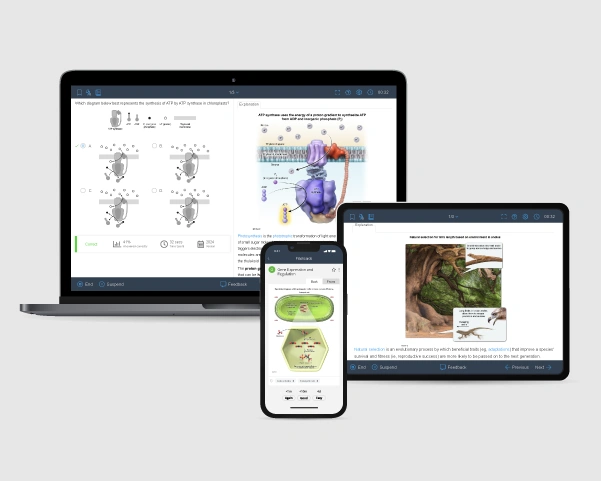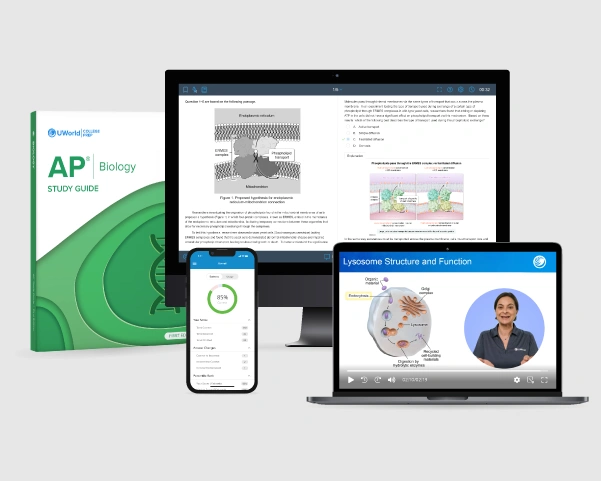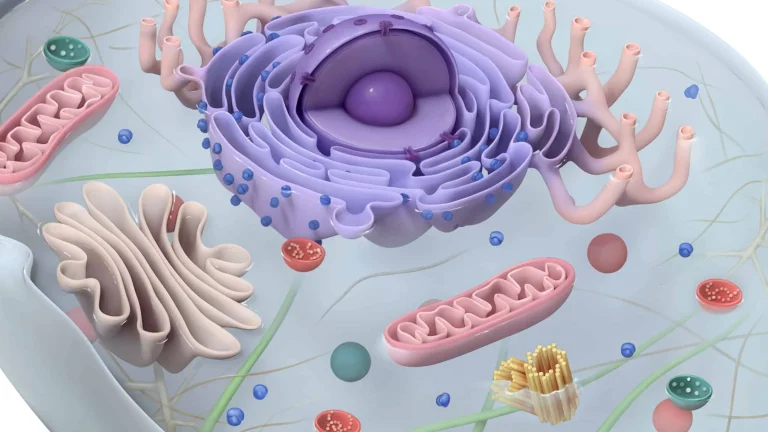Whether you’re exploring which AP subjects are right for you or you’re ready to dive into your AP Bio exam prep, we’ve got you covered with our comprehensive guide.
What Is AP Biology Equivalent To & Who Can Take It?
AP Biology is a two-semester introductory course typically offered in college for biology majors. The curriculum covers a wide range of topics, including molecular biology, genetics, natural selection, anatomy, and ecology. Students learn through lectures and hands-on lab experiments, allowing them to collect, analyze, and draw conclusions based on the core biological concepts. A strong performance on the AP Biology exam can earn you free college credit. Many colleges offer free credits for students with a score of 3 or above.
The ideal AP Biology student is interested in Biology and has a solid foundation in high school biology and chemistry. Most AP instructors recommend these subjects as prerequisites to ensure success. AP Biology requires significant time and effort to master the material, complete assignments, and prepare for the exam.
Many students take AP Bio to align with their intended college majors or career goals, such as medicine or scientific research. For others, the exam offers an opportunity to earn general education credits while developing critical thinking and practical skills. AP Biology is especially beneficial for students curious about Biology or pursuing science-related careers.
The AP Biology exam depends heavily on factual recall and concept application. The highest score you can get on the exam is 5. Your final score, ranging from 1-5, is a weighted combination of your scores in each exam section.
The below AP Biology scores table shows an estimated score conversion for each final grade.
| Final AP Biology Score | College Grade Equivalent |
|---|---|
| 5 | A+ or A |
| 4 | A-, B+, or B |
| 3 | B-, C+, or C |
| 2 | — |
| 1 | — |
Understanding what to expect on the exam is also crucial. So, here’s some essential AP Biology exam information.
What Is on the AP Biology Exam?
The AP Biology exam tests your skills in concept and process mastery, as well as your understanding of biological systems on different scales. Let’s go through some essential AP Biology exam information so you know what to expect on the exam.
The exam will test your knowledge of 4 Big Ideas:
- Evolution (EVO)
- Energetics (ENE)
- Information Storage and Transmission (IST)
- Systems Interactions (SYI)
While these big ideas are the foundation of the exam, each topic is divided into commonly taught units to make teaching and learning efficient and comprehensive. Let’s look at what these 8 units are and their relative weight in the exam.
| Instruction Units | Exam Weightage |
|---|---|
| Chemistry of Life | 8–11% |
| Cell Structure & Function | 10–13% |
| Cellular Energetics | 12–16% |
| Cell Communication & Cell Cycle | 10–15% |
| Heredity | 8–11% |
| Gene Expression & Regulation | 12–16% |
| Natural Selection | 13–20% |
| Ecology | 10–15% |
AP Biology Exam Format for 2025
The exam format is divided into two major sections — multiple-choice and free response. There are a total of 60 multiple-choice questions and 6 free-response questions. The AP Biology Exam lasts for 3 hours in total. There is no penalty for incorrect answers, so take your best shot at each question.
| Question Type | Score Weightage | Number of Questions | Time |
|---|---|---|---|
| Multiple-Choice Questions | 50% of the total score | 60 questions | 90 minutes |
| Free-Response Questions | 50% of the total score | 6 questions | 90 minutes |
Free-response questions are divided into two types — four short-answer questions and two long-answer questions. In other words, these answers require paragraph-form answers. This is a hybrid exam. You will complete the multiple-choice section and view free-response questions in the Bluebook testing app, but your free-response answers will be handwritten in paper exam booklets. The FRQs will be manually graded by AP Readers—experienced AP teachers and college professors who evaluate each answer individually.
If you would like to know more about the exam format and the topics on which you will be tested, check out our overview of the AP Biology exam format. Now, let’s get to the most important part — Why AP Biology? Should you take the AP Biology Exam? Let’s find out!
Why Take AP Biology?
AP Biology is consistently one of the most popular AP courses each year. In the year 2024, 260,062 students attempted the AP Biology exam, and 68.3% scored 3 or above. It's challenging but offers many benefits, including real-life application through hands-on lab work. Here are some key advantages of taking AP Biology:
-
Competitive Transcript for College Admission:
AP Biology demonstrates readiness for college-level academics, which can strengthen your college application.
-
Free College Credits:
Scoring a 3 or higher on the AP Bio exam can earn you college credits, depending on the college’s conversion policy.
-
Save Time & Tuition:
Earning college credit allows you to bypass introductory courses, saving both time and money, and potentially helping you graduate early.
-
In-Depth Introduction to Biology:
AP Biology offers a deeper, more analytical approach to biology, preparing you for college coursework.
-
Hands-On Lab Experiments:
It includes 25% lab work, helping you develop practical scientific skills that will benefit you in college labs.
-
Strong Foundation for College:
The content mirrors college-level biology, giving you a strong foundation for future studies.
-
Decide Whether Biology Is Right For You:
Is Biology for you? Taking AP Biology is the perfect way to get a feel of what studying biology at higher levels would be like. It could help you figure out whether or not you are ready for or want a biology-focused career, and using an AP Biology online course can give you extra support along the way.
As you can see, many perks come with tackling AP Biology and acing the exam, especially if you’re a science enthusiast or high achiever looking for a challenge.

Should I Take AP Biology?
The subject is designed to be challenging, so acing the AP Biology exam plus achieving a score of 3+ is an impressive accomplishment that may be more attainable for students who can answer “yes” to one or more of the following questions:
-
Have You Studied Biology in High School?
It is recommended across the board that students intending to opt for AP Biology should study biology at the high school level. It is even better if students take Chemistry, as well. Many concepts in AP Biology require an understanding of chemical compounds and reactions. While you can still take AP Biology without taking biology as a subject in high school, it isn’t suggested. It can be very challenging to grasp concepts and do well because the foundation you would’ve otherwise built from studying high school biology would be lacking.
-
Are You Passionate About Biology?
If you are naturally drawn to biology and find the subject matter interesting, you will likely enjoy this. This exam will allow you to explore various advanced biology concepts in a new way allowing you to delve deeper into exciting topics like molecular biology, natural selection, genetics, and ecology. You’ll explore the intertwined nature of biological systems from a microscopic scale to a macroscopic scale. If this excites you, AP Biology is a good fit for you.
-
Do You Want To Study Biology in College?
For students who are 100% certain they want to pursue a biology major in college, taking AP Biology and crushing the exam is a no-brainer since it’s a great way to knock out a foundational prerequisite course. Suppose you are considering a biology major vs. another science major. In that case, AP Biology allows you to see whether you like biology over the other sciences, so your academic and career goals are clear early in college. High-achieving students who lean more toward other subjects also take AP Biology and achieve big things by demonstrating to colleges that they are academically well-rounded, plus scoring credit toward their general education requirements.
-
Has Biology Been a High-Scoring Subject in the Past?
If you're considering AP Biology, you should know how well you can do in biology based on your previous science coursework. While being passionate about the subject is important, it’s equally essential to be able to study and ace the exams. If one of your academic strengths has been biology, then AP Biology is a good fit for you.
We also recommend that you talk to people you know who have taken AP Biology and the exam at your school. They can help you understand what to expect so you can decide whether this is right for you.
Going through the curriculum is another excellent way to explore whether the topics covered in AP Biology interest you. Additionally, you can consider enrolling in an AP Biology prep course to prepare for the exam and gain a deeper understanding of the material.
How Hard Is AP Biology?
One common question is, “Is AP Biology hard?” Just like trying to decide whether AP Biology is the subject for you, figuring out if it's hard or not is also subjective. The answer to the question depends on your aptitude for biology and your ability to prepare for a challenging exam.
We've put together a few pointers to help you gauge how easy or difficult you might find this AP Biology exam.
- If you have a strong background in math and science, you may find the AP Biology exam more manageable. The curriculum builds on high school biology, math, and chemistry knowledge, but success requires mastering complex concepts, applying scientific reasoning, and developing strong writing skills. AP Biology emphasizes application-based exam questions, requiring a deep understanding of material and the ability to draw scientific conclusions. For more detailed information, key topics and units, refer to the AP Biology CED.
- Consider your academic and extracurricular commitments when deciding if you have time for AP Biology. If your schedule is already packed, balancing this subject with other responsibilities may be overwhelming. Talking to your guidance counselor can help you assess whether AP Biology is a good fit for your abilities and overall workload.
AP Biology Exam Review Tips
AP Biology may be challenging, but we have a few quick exam review tips to help you ace the exam!
-
Make a schedule:
Plan your study time to stay on track with the material. You can review practice test questions as you cover each unit or set aside specific time blocks for weekly or monthly reviews. Consistent preparation will help reinforce concepts, especially those you covered earlier in the year.
-
Get familiar with the exam's format:
Understand the structure of the exam so you know what to expect. The test is split evenly between multiple-choice and written questions. Practice answering sample questions to develop a clear structure for your written responses and demonstrate your ability to apply what you've learned.
-
Test prep toolkit:
Build a collection of review resources beyond your textbook. Create a formula sheet for quick reference and deeper understanding.
Invest in quality prep materials such as UWorld's online AP Biology practice tests, which allow you to track progress and review detailed answer explanations with educational illustrations. Challenging yourself with these resources will help you feel confident on test day.
Check out our article on How to Study AP Biology for more AP Biology exam review tips. Additionally, you can use our AP Biology Study Guide, available in both print and digital formats, to further enhance your preparation. It includes over 120 end-of-topic "Check for Understanding" questions, designed to help reinforce the material and ensure you grasp key concepts.

Frequently Asked Questions (FAQs)
What to bring to the AP Biology exam?
Since AP Biology is a hybrid digital exam, ensure you have the following:
Required Items:
- Photo ID (school-issued or government-issued, required if testing elsewhere)
- Fully charged device & power cord
- College Board login credentials
- A watch (non-smart)
- Two No. 2 pencils with erasers
- Two pens (black or dark blue ink)
- Four-function, graphing, or scientific calculator (approved models)
- Pens/pencils for school-supplied scratch paper
Optional Items:
- External mouse (for convenience)
- External keyboard:
- Required for tablets/iPads
- Optional for hybrid exams on an iPad
- Not allowed for laptops
When is the AP Biology exam for 2026?
The AP Biology exam in 2026 will be held on May 4 at 8 AM local time.
When is AP Biology 2025?
The AP Biology exam in 2025 will be held on May 5 at 8 AM local time.
What happens if you fail the AP Biology exam?
You can retake the AP exam as many times as you want, but the College Board offers them only once a year. For graduating seniors, retaking may not be practical. If you didn’t get your desired score, don’t be discouraged! Research shows AP students, even those scoring below a 3, outperform non-AP peers in college. Reflect on your study habits and use those insights to grow in your academic and career journey.
When do students usually take AP Biology?
Most students take the AP Bio exam in their junior or senior year of high school.
How much does the AP Biology exam cost?
The AP Biology exam costs $99 for students residing in the U.S, Canada and U.S. territories and $129 for everyone else. You can learn more about this from our AP Exam Eligibility & Registration page.
Do you need to take chemistry before AP Biology?
No, but taking a high school chemistry before taking AP Biology is highly recommended.
References
- (2024). Past AP Biology Score Distributions. AP Students. Retrieved on December 24, 2024 from https://apstudents.collegeboard.org/about-ap-scores/score-distributions/ap-biology
- (2024). AP Calculator Policy and Equations and Formulas Sheet. AP Biology. AP Central Retrieved December 24, 2024, from https://apcentral.collegeboard.org/courses/ap-biology/exam
- (2024). What Students Should and Should Not Bring. AP Central. Retrieved December 24, 2024, from https://apcentral.collegeboard.org/exam-administration-ordering-scores/administering-exams/preparing-for-exam-day/what-students-can-cannot-bring
Read More About AP Biology
Understanding the exam format gives you an advantage. We’ve created a concise guide that breaks down the exam format, question types, key strategies, and more!
AP Biology CEDCheck out our comprehensive overview of the AP Biology curriculum for detailed information on the units, topics, and key concepts you'll study through the course.
AP Biology Scoring GuideThis article covers everything you need to know about how the AP Biology exam is scored, score distribution, and the average score needed to earn college credit.
How to Study AP BiologyA complete guide with expert tips on how to prepare for and excel in the AP Biology exam using personalized study plans and proven study techniques.
Best AP Biology Prep Course ReviewSearching for top AP Biology prep courses? Read this review to compare the best courses and choose the perfect one for your success.
Best AP Biology Study Guide ComparisonCompare the best AP Biology study guides! See how Kaplan, Barron's, and Princeton Review stack up against UWorld for comprehensive exam prep




